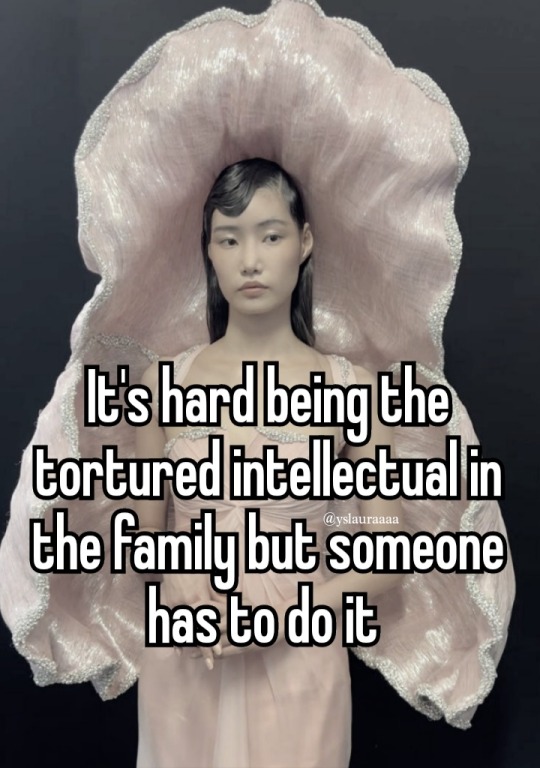#intellectual freedom
Text
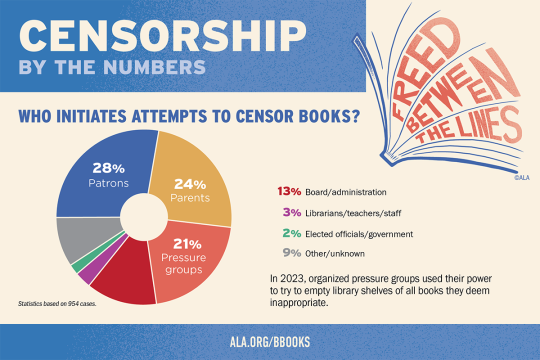


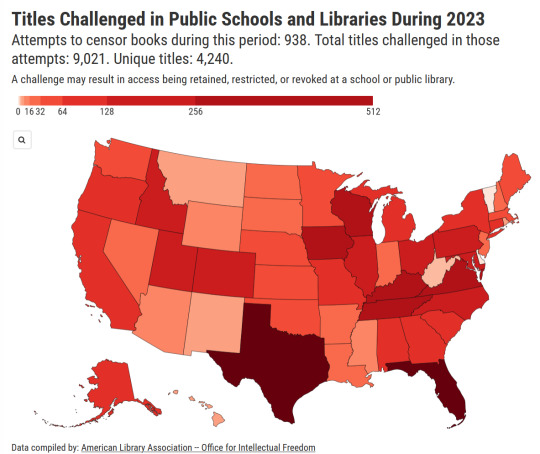
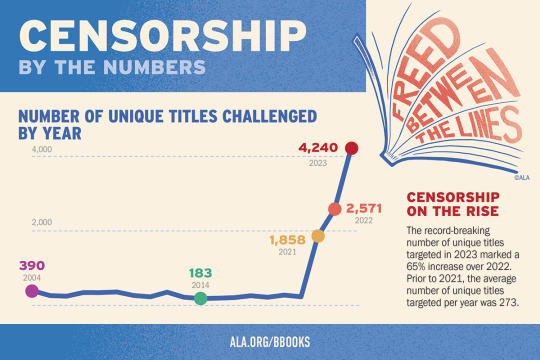
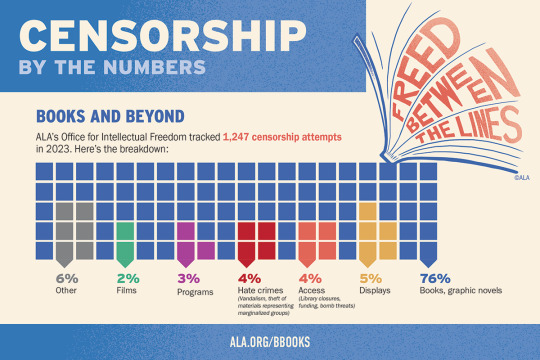
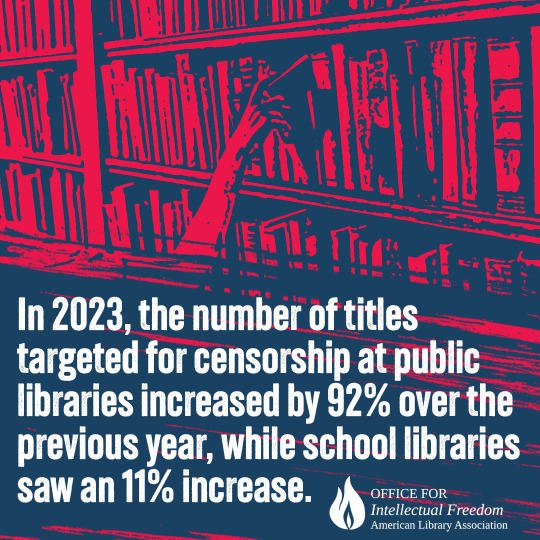
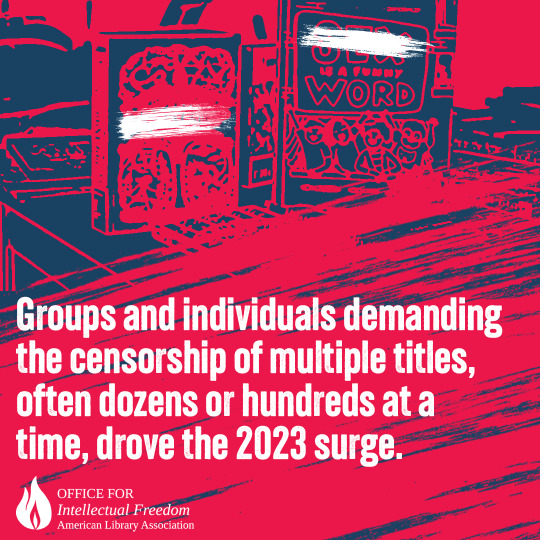
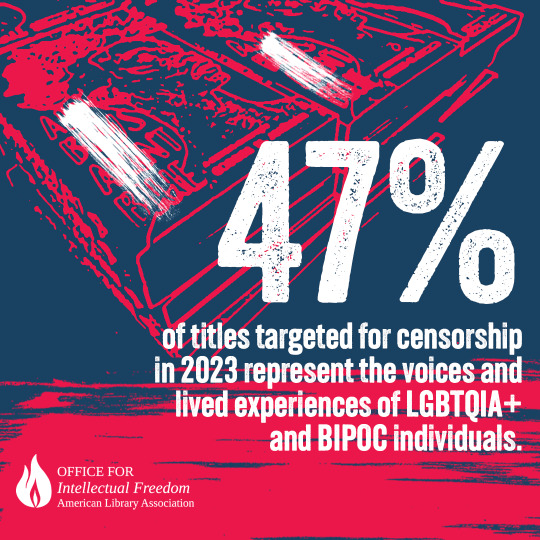
The ALA's State of America's Libraries Report for 2024 is out now.
2023 had the highest number of challenged book titles ever documented by the ALA.
You can view the full PDF of the report here. Book ban/challenge data broken down by state can be found here.
If you can, try to keep an eye on your local libraries, especially school and public libraries. If book/program challenges or attacks on library staff are happening in your area, make your voice heard -- show up at school board meetings, county commissioner meetings, town halls, etc. Counterprotest. Write messages of support on social media or in your local papers. Show support for staff in-person. Tell others about the value of libraries.
Get a library card if you haven't yet -- if you're not a regular user, chances are you might not know what all your library offers. I'm talking video games, makerspaces (3D printers, digital art software, recording equipment, VR, etc.), streaming services, meeting spaces, free demonstrations and programs (often with any necessary materials provided at no cost!), mobile WiFi hotspots, Library of Things collections, database subscriptions, genealogy resources, and so on. A lot of electronic resources like ebooks, databases, and streaming services you can access off-site as long as you have a (again: free!!!) library card. There may even be services like homebound delivery for people who can't physically come to the library.
Also try to stay up to date on pending legislation in your state -- right now there's a ton of proposed legislation that will harm libraries, but there are also bills that aim to protect libraries, librarians, teachers, and intellectual freedom. It's just as important to let your representatives know that you support pro-library/anti-censorship legislation as it is to let them know that you oppose anti-library/pro-censorship legislation.
Unfortunately, someone being a library user or seeing value in the work that libraries do does not guarantee that they will support libraries at the ballot. One of the biggest predictors for whether libraries stay funded is not the quantity or quality of the services, programs, and materials it offers, but voter support. Make sure your representatives and local politicians know your stance and that their actions toward libraries will affect your vote.
Here are some resources for staying updated:
If you're interested in library advocacy and staying up to date with the challenges libraries are facing in the U.S., check out EveryLibrary, which focuses on building voter support for libraries.
Book Riot has regular articles on censorship attempts taking place throughout the nation, which can be found here, as well as a Literary Activism Newsletter.
The American Library Association's Office for Intellectual Freedom focuses on the intellectual freedom component of the Library Bill of Rights, tracks censorship attempts throughout each year, and provides training, support, and education about intellectual freedom to library staff and the public.
The Electronic Frontier Foundation focuses on intellectual freedom in the digital world, including fighting online censorship and illegal surveillance.
I know this post is long, but please spread the word. Libraries need your support now more than ever.
107 notes
·
View notes
Text
The Power and Purpose of Strikes
Simone Weil, the philosopher/anarchist/mystic, describing an ideal political future for France after WW2, lamented that trade unions have become primarily concerned with wages. This might seem strange to us now, when even this activity is so contested by conservatives, but Weil saw it as playing too much into the capitalist spirit.
She saw this as just one of trade unions’, and the worst of the lot, because it encourages workers to think about personal monetary gain rather than justice, solidarity, and even their own needs beyond the material. It also risks the union becoming institutionalised through frequent direct interactions with established economic forces. Again, this will sound weird today, given how unions fighting for wages represent one of the few remaining avenues for working class justice, and yeah Weil was a Catholic with strong convictions about the importance of moralism, but I think fundamentally she had higher hopes than we can easily imagine today.
I think a lot of people sense the truth of what she says today - though unfortunately it’s usually conservatives, who would turn back on it immediately if they recognised what it was they were saying. You see it when they say “Why are train drivers striking? Why are writers striking? Why do they think they deserve more than nurses, or posties, or actors?” And of course, the answer is: “They should strike too!” (As some of them now are 🎉). But it’s true that the narrow focus on wages does foster a sort of competitive individualism which can undermine solidarity with other industries. This means that a more revolutionary conception of unions is needed, which is not what these critics have in mind, but it is what Simone Weil has in mind.
What Weil sees in trade unions is the potential for fostering community, freedom of intellectual and spiritual thought, and a degree of independence from capitalism, all of which amount to a greater degree of what she calls ‘rootedness’ - something involving confidence in truth, having material needs met, security in community, and relative freedom (among other things). She saw them as being able to foster solidarity to meet workers’ need for community, free them from the corrupting influence of monetary concerns, and fight for justice as a group. She also hoped that they could provide a space for freedom of thought, to avoid the fetishisation of community she saw in both the French and Russian revolutions.
Trade unions then should not merely concern themselves with accumulating resources, but also with accumulating time and freedom - with the expansion of what Henri Lefebvre called everyday life, the time in which we are free to do what we want and create new types of experiences. When we have enough of it, we can build our own institutions free from capitalist influence which can form the infrastructure for disruptive situations. This can be mutual aid groups, creative projects, intellectual and spiritual communities, and reimaginings of what it means to work, through permablitzing, learning crafts, and starting co-operatives.
The ideal version of this is the general strike. Walter Benjamin described the general strike as a form of divine violence, violence which acts instantaneously, bloodlessly, without coercion. Rather than sort of blackmailing capitalists, as most strikes do, the general strike is (ideally) a complete disengagement with the entire capitalist system. It asks nothing of it, and simply makes it irrelevant by building entirely new social relations in its place. This is not at all feasible with where we are at the moment, but I like to think that it can be used as an inspiration for incorporating more utopian ideas into our more limited actions, all of which are still so radical in this current climate.
#philosophy#sociology#social theory#anarchism#unions#trade unions#wga strike#sag strike#writers strike#ups strike#actors strike#train strikes#worker solidarity#solidarity#freedom#freedom of thought#intellectual freedom#communism#simone weil#walter benjamin#henri lefebvre#mutual aid#situationism
85 notes
·
View notes
Text
"Never seen anything like this": U.S. librarians report book bans hit record high in 2022

by Julia Conley
Librarians from across the United States released a report showing that pro-censorship groups' efforts to ban books with LGBTQ+ themes and stories about people of color have driven an unprecedented rise in the number of book challenges, with right-wing organizers pushing library workers to remove works ranging from the dystopian novel The Handmaid's Tale to children's books about foods enjoyed in different cultures.
According to the American Library Association (ALA), a record-breaking 2,571 unique titles were challenged in 2022, a 38% increase from the previous year.
The organization recorded 1,269 demands to censor books from various groups and individuals, compared to 729 challenges counted in 2021.
"Each attempt to ban a book by one of these groups represents a direct attack on every person's constitutionally protected right to freely choose what books to read and what ideas to explore," said Deborah Caldwell-Stone, director of the ALA Office for Intellectual Freedom. "The choice of what to read must be left to the reader or, in the case of children, to parents. That choice does not belong to self-appointed book police."
READ MORE
64 notes
·
View notes
Text
Being a red shirt on the info literacy and empathy front lines.
This is a bit of a meta post and by "going there" I'm really just trying to generate more of the sort of "you are seen" genre for whomever it has meaning. If it has a whiff of "look at me, I'm an ally, I'm helping by yelling into the void" then I don't know really know what to tell you, maybe it is and if it is, feel free to keep on scrolling, I am not consciously demanding your affirmation, just rambling about the role of sci-fi in my life in getting me to this point ethically and professionally.
I am a red state millennial librarian. Don't feel as sorry for me as you might reflexively think I want you to. I'm not a public librarian or a public school librarian, I'm an academic librarian. Moms for Liberty hasn't directed its Eye of Sauron at us (yet.) Thus we're able to keep stocking LGBTQ literature without too much worry of people screaming at us. For now at least.
Why does this matter?
Well through a little loophole we are officially an academic library that provides services to young adults and the public in addition to formal college students without being a public or school library. I'm reluctant to share too many biographical details, but suffice to say you might be surprised at what is part of your nearest academic library collection and it may be easier than you think to access that collection.
Individual institutions are going to have their own policies, however because we are part of a broader consortium that all shares resources, we offer reciprocal services to every member of that consortium and their patrons if those patrons come to us with a valid library card from one of the member counties or a peer institution.
So if your public library has been gutted, take a peak at local colleges. They are more likely than you think to have queer literature, including queer and diverse literature in the YA genre, as well as inclusive children's books even picture books. College libraries know many of their students are either parents or are intending to go into public education (god help them) and thus have some very infrequently utilized special collections that they would love to see circulate so they can justify buying more.
This being a nerd blog, let me just speak briefly of the role of sci-fi and fantasy allegories in my development. I could very easily have been one of the people that I fear may come for my job. The people we have done workshops rehearsing how to respond professionally, empathetically, but also forcefully to formal challenges to what's on our shelves and informal challenges - i.e. people intent on making spectacles.
I don't say that I "fear" these people lightly, our head of DEI initiatives was sacked after the program was expected (and ultimately) was defunded. This person was not offered a job in a different department. I'm not super in touch with what goes on outside my department but I'm told that this person was broadly respected and other than their job title, was never involved in anything controversial or had any interpersonal disputes.
So we who are heteronormative don't get the luxury of putting our heads down and assuming this will blow over. We can't actually know with any certainty how many degrees of separation are between us and the ire of the Christian Nationalist fever that has swept the nation.
Anywho, Handmaid's Tale isn't exactly the sci-fi I meant to talk about (although boy howdy did it scare the bejeezus out of me the first time I listened to it and that was - I think - pre-2016.)
I grew up in a very rural area with minimal diversity. My exposure to diversity and later queer representation was almost entirely through media. Star Trek was a big one, but also Roseanne which ironically makes the comedian's red pilling more heart breaking than JK Rowling - its a xenniel thing, I was in my edgy ironic full of myself no time for childish things teenage years when Harry Potter came out.
I'm sitting here in 2023, and I can see the absurd falseness of the rhetoric of grooming discourse. Riker's fling with an androgynous alien or Jadzia Dax's open pansexuality didn't make me queer. It de-stigmatized being queer and left me open to taking seriously the self expressed experiences of people who I was open to befriending. As an adult, while I've found Discovery to be frustrating in many ways, one of the things that keeps me coming back is Culber and Stamets. Their performances and arcs have been a consistently solid part of an otherwise very messy production.
Much as Culber and Stamets are simply decent human beings just trying to get by and overcome crisis after crisis, so too are the queer people I've befriend. Their sinister agenda is to walk in public with their partner without people walking between them not thinking they're actually together or being harassed. Some of them are parents of developmentally well adjusted children.
I'm not looking for ally virtue signal points by praising these storylines, I'm just recognizing them for what they are: pieces of my development as a person. Which makes me happy to be in a place in my life where if nothing else, for now I get to make available a wide variety of experiences and perspectives for people to be exposed to. Its not my job to force anything on anyone and I order plenty of straight forward murder mysteries, romances, and swashbuckling epics that don't require a lot of critical thinking, but I like knowing that something I placed on the shelf might make someone accept themselves or accept someone else.
#red state library#books unite us#pride month#we need diverse books#star trek#academic libraries#intellectual freedom
14 notes
·
View notes
Text
Use your head!
Discernment, reflection, testing, and intellectual renewal are all biblical mandates,
These Jews were more receptive than those in Thessalonica, for they welcomed the message very eagerly and examined the scriptures every day to see whether these things were so. Acts 17:11
Do not be conformed to this world, but be transformed by the renewing of your minds, so that you may discern what is the will of God—what is good and acceptable and perfect. Romans 12:2
Let two or three prophets speak, and let the others weigh what is said. 1 Corinthians 14:29
See to it that no one takes you captive through philosophy and empty deceit, according to human tradition, according to the elemental spirits of the universe, and not according to Christ. Colossians 2:8
But test everything; hold fast to what is good 1 Thessalonians 5:21
~ Samples, Kenneth Richard. ‘Without a Doubt: Answering the 20 Toughest Faith Questions. p. 256
2 notes
·
View notes
Text

Reblogs were turned off so here is the post
The Verge article
Relevant tweet
#intellectual freedom#media preservation#archive#archive.org#archive dot org#hachette book group#harpercollins#wiley#john wiley and sons#penguin random house#random house#publishers
16 notes
·
View notes
Text

The Heritage Foundation Project 2025, Page 8
“Cultural institutions like public libraries and public health agencies are only as “independent” from public accountability as elected officials and voters permit.”
Two things I take away from this.
The first is that the concept of independence is implicitly anathema under Project 2025. The idea that an institution would take up and interpret a mission according to a set of internalized best practices, professionalism, evidence, and political agnosticism is unacceptable.
I realize that no human activity can ever be completely apolitical or free of error and bias, but there’s no room for benefit of the doubt that the Heritage Foundation has a set of what it is going to assert as objective truths about how public institutions must undertake their work and especially in the case of public health and libraries it will almost certainly not be in consultation with veteran practitioners.
We must avoid uncritical worship of expertise but we must also take expertise seriously rather than dismiss it out of hand because it disagrees with our aesthetic preferences.
The second is the positioning of public libraries and public health.
The CIA ran a clandestine abduction and torture program and then destroyed the tapes when subpoenaed by Congress. This wasn’t during the Cold War, it was in the 2000s.
There’s been exactly zero public reckoning with the efficacy and downstream consequences of the widespread use of drone strikes and kill capture raids as part of the Global War on Terror.
Dept of Homeland Security is accused of so many abuses of undocumented migrants that there are wars that have resulted in fewer civilian deaths.
A not insignificant part of the right believes that the FBI and Dept of Justice are complicit in persecuting Trump to sabotage his 2024 candidacy after colluding to undermine his Presidency and reelection bid.
But in the eyes of the Heritage Foundation, public libraries and public health are the menaces most worth singling out by name as dangerous renegades who must be brought back into compliance.
The Heritage Foundation is not 4Chan. It is not a collection of Substack cranks posting into the void. It’s a respected conservative think tank. Conservative politicians and government officials turn to it and it’s like for policy proposals and often ghost written legislation.
Take them seriously.
Take them literally.
#civil rights#intellectual freedom#donald trump#heritage foundation#project 2025#fascism#nationalist conservatism#conservatism#libraries are for everyone#books & libraries#books and reading#public health#public libraries
3 notes
·
View notes
Text
"To refuse a hearing to an opinion, because they are sure that it is false, is to assume that their certainty is the same thing as absolute certainty. All silencing of discussion is an assumption of infallibility."
John Stuart Mill (1806-1873) English political philosopher.
87 notes
·
View notes
Text

Visit the United Against Book Bans website to access resources on how to take action to prevent and combat book bans, whether through direct action and protest, social media campaigns, or to donate to support librarians facing backlash in the defense of intellectual freedom
#united against book bans#book bans#library censorship#book banning#right to read#right to read day#intellectual freedom#libraries#librarians#support libraries
14 notes
·
View notes
Text
A Kentucky lawmaker’s proposal criticized as a “book banning” bill passed the state Senate Thursday. The measure would make it easier for parents to challenge books and instructional materials in schools they find obscene and harmful to minors.
Senate Bill 5 filed by Republican Sen. Jason Howell of Murray would require districts to create a process for parents to request banning certain books, materials, programs and school events. Parents can file requests that would start with the principal and then go to the local board of education, if needed.
The purpose of Senate Bill 5, Howell told his fellow senators Thursday, is to ensure a parent's right to be involved in their children's access to materials, programs or events in school.
“They [parents] need to be able to have a voice when those items are in conflict with their families values and beliefs,” he said.
Under the bill, material “harmful to minors” means it:
“Contains the exposure in an obscene manner, of the unclothed or apparently unclothed human male or female genitals, pubic area, or buttocks or the female breast, or visual depictions of sexual acts or simulations of sexual acts, or explicit written descriptions of sexual acts.”
“Taken as a whole, appeal[s] to the prurient interest in sex.”
“Is patently offensive to prevailing standards regarding what is suitable for minors.”
Howell brought the measure amid a wave of attempts by conservatives to censor or ban books nationwide. Titles most commonly targeted usually center LGBTQ, Black and Latino voices.
14 notes
·
View notes

